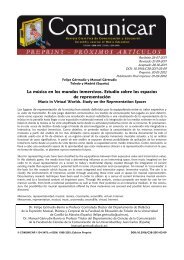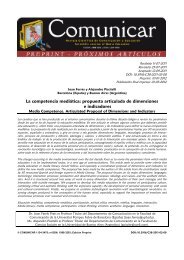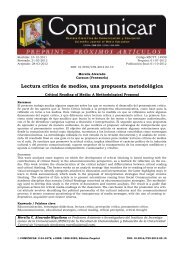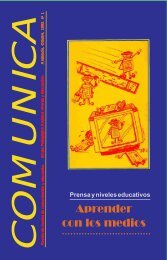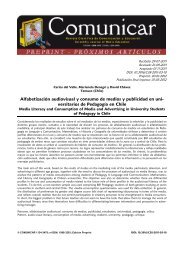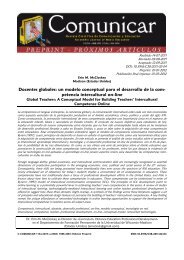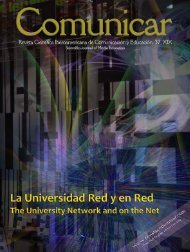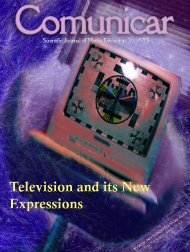Comunicar 39-ingles - Revista Comunicar
Comunicar 39-ingles - Revista Comunicar
Comunicar 39-ingles - Revista Comunicar
You also want an ePaper? Increase the reach of your titles
YUMPU automatically turns print PDFs into web optimized ePapers that Google loves.
INVESTIGACIONES / RESEARCHl Charo LacalleBarcelona (Spain)Received: 17-01-2012 / Reviewed: 18-03-2012Accepted: 03-04-2012 / Published: 01-10-2012DOI: 10.<strong>39</strong>16/C<strong>39</strong>-2012-03-01Genre and Age in the Reception ofTelevision FictionGénero y edad en la recepción de la ficción televisivaABSTRACTThis article summarizes the main results of an investigation that is part of a project regarding the construction of youthand gender identity in television fiction. The methodology integrates reception analysis (focus group) with data ob -tained through an anonymous questionnaire, designed to contextualize the results of the qualitative research.Television fiction is the favourite macro-genre of young people, especially women. Broadly speaking, participantsappreciate the greater proximity of Spanish fiction, which favours the different mechanisms of identification/projectionactivated during the reception process, and they acknowledge that TV fiction has a certain didactic nature. Theresearch highlights the more intimate nature of female reception compared to the detachment of the male viewer,who watches fiction less frequently and assimilates it as pure entertainment. Age influences the different modes ofreception, while the social class and origin of participants hardly have any impact. Confident, rebellious and ambivalentcharacters are found to be more interesting than the rest. By contrast, the structure of the story and a majorpart of the topics addressed by the programme are usually consigned to oblivion, highlighting the importance of selectivememory in the interpretative process, as well as suggesting the limited nature of the effects of television fiction.RESUMENEl artículo resume los principales resultados de una investigación integrada en un proyecto más amplio sobre la construcciónde la identidad juvenil y de género en la ficción televisiva. La metodología combina el análisis de la recepción(«focus group») con los datos obtenidos mediante un cuestionario anónimo, destinados a contextualizar losresultados del estudio cualitativo. La ficción televisiva es el macrogénero preferido por los jóvenes, sobre todo porlas mujeres. En general, los participantes aprecian la mayor proximidad de la ficción española, propiciadora de losdiferentes mecanismos de identificación/proyección activados en los procesos de recepción, y le reconocen un ciertocarácter didáctico. La investigación pone de manifiesto el carácter más intimista de la recepción femenina, frente almayor distanciamiento de un espectador masculino mucho más inconstante, que asimila la ficción con el puro entretenimiento.La edad influye principalmente en las diferentes modalidades de recepción, mientras que apenas seconstata la incidencia de la clase social ni del origen de los participantes. Los personajes seguros de sí mismos, rebeldesy ambivalentes, interesan más que el resto. Por el contrario, la estructura del relato y una buena parte de lostemas del programa visionado se relegan generalmente al olvido, lo que revela el peso de la memoria selectiva enlos procesos de interpretación y sugiere el carácter limitado de los efectos de la ficción televisiva.KEYWORDS / PALABRAS CLAVEYoung people, gender, television fiction, Internet, reception, interpretation, characters.Jóvenes, género, ficción, televisión, Internet, recepción, interpretación, personajes.v Dr. Charo Lacalle-Zalduendo is Professor in the Department of Journalism in the Faculty of CommunicationSciences at the Autonomous University of Barcelona (Spain) (rosario.Lacalle@uab.es).<strong>Comunicar</strong>, n. <strong>39</strong>, v. XX, 2012, Scientific Journal of Media Education; ISSN: 1134-3478; pages 111-118www.comunicarjournal.com



